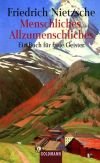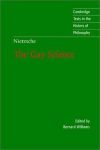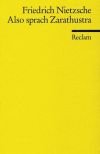
Το Ecce homo. Wie man wird, was man ist είναι χειρόγραφο του Γερμανού φιλόσοφου Φρειδερίκου Νίτσε. Ο συγγραφέας έγραψε το χειρόγραφο από το 1888 μέχρι την κατάρρευση της υγείας του το 1889. Το χειρόγραφο δημοσιεύτηκε το …

Human, All Too Human: A Book for Free Spirits is a book by 19th century philosopher Friedrich Nietzsche, originally published in 1878. A second part, Assorted Opinions and Maxims, was published in 1879, and a third part, The Wanderer and his Shadow, followed in 1880. The book is Nietzsche's first in the aphoristic …

The Antichrist is a book by the philosopher Friedrich Nietzsche, originally published in 1895. Although it was written in 1888, its controversial content made Franz Overbeck and Heinrich Köselitz delay its publication, along with Ecce Homo. The German title can be translated into English as both "The Anti-Christ" and …

On the Genealogy of Morality: A Polemic is a 1887 book by German philosopher Friedrich Nietzsche. It consists of a preface and three interrelated essays that expand and follow through on doctrines Nietzsche sketched out in Beyond Good and Evil. The three Abhandlungen trace episodes in the evolution of moral concepts …

The Will to Power is a book of notes drawn from the literary remains of philosopher Friedrich Nietzsche by his sister Elisabeth Förster-Nietzsche and Heinrich Köselitz. The Will to Power is also the title of a work that Nietzsche himself had considered writing. The work was first translated into English by Anthony M. …

The Gay Science is a book by Friedrich Nietzsche, first published in 1882 and followed by a second edition, which was published after the completion of Thus Spoke Zarathustra and Beyond Good and Evil, in 1887. This substantial expansion includes a fifth book and an appendix of songs. It was noted by Nietzsche to be …

Dionysian-Dithyrambs is a collection of nine poems written in the fall of 1888 by Friedrich Nietzsche under the nom de plume of Dionysos. The first six poems were published in the 1891 edition of Also sprach Zarathustra. Other three poems are compositions drawn from those found in Also sprach Zarathustra only slightly …

 English
English Español
Español Deutsch
Deutsch


